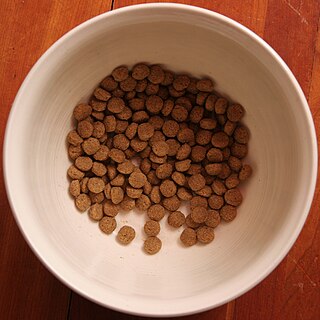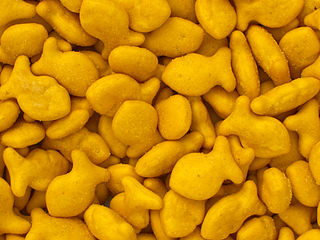Related Research Articles

Dog food is specifically formulated food intended for consumption by dogs and other related canines. Dogs are considered to be omnivores with a carnivorous bias. They have the sharp, pointed teeth and shorter gastrointestinal tracts of carnivores, better suited for the consumption of meat than of vegetable substances, yet also have ten genes that are responsible for starch and glucose digestion, as well as the ability to produce amylase, an enzyme that functions to break down carbohydrates into simple sugars – something that obligate carnivores like cats lack. Dogs evolved the ability living alongside humans in agricultural societies, as they managed on scrap leftovers and excrement from humans.

A garden centre is a retail operation that sells plants and related products for the domestic garden as its primary business.
Ralston Purina Company was a St. Louis, Missouri,–based American conglomerate with substantial holdings in animal feed, food, pet food, consumer products, and entertainment. On December 12, 2001, it merged with Swiss food-giant Nestlé's Friskies division to form Nestlé Purina PetCare Company.

Hardware stores, sometimes known as DIY stores, sell household hardware for home improvement including: fasteners, building materials, hand tools, power tools, keys, locks, hinges, chains, plumbing supplies, electrical supplies, cleaning products, housewares, tools, utensils, paint, and lawn and garden products directly to consumers for use at home or for business. Many hardware stores have specialty departments unique to its region or its owner's interests. These departments include hunting and fishing supplies, plants and nursery products, marine and boating supplies, pet food and supplies, farm and ranch supplies including animal feed, swimming pool chemicals, homebrewing supplies and canning supplies.

A product recall is a request from a manufacturer to return a product after the discovery of safety issues or product defects that might endanger the consumer or put the maker or seller at risk of legal action. Product recalls are one of a number of corrective actions that can be taken for products that are deemed to be unsafe.

Cargill, Incorporated is an American multinational food corporation based in Minnetonka, Minnesota, and incorporated in Wilmington, Delaware.
Raw feeding is the practice of feeding domestic dogs, cats, and other animals a diet consisting primarily of uncooked meat, edible bones, and organs. The ingredients used to formulate raw diets vary. Some pet owners choose to make home-made raw diets to feed their animals but commercial raw diets are also available.

Goldfish is a brand of fish-shaped cracker with a small imprint of an eye and a smile manufactured by Pepperidge Farm, which is a division of the Campbell Soup Company. The brand's current marketing and product packaging incorporate this feature of the product: "The Snack That Smiles Back! Goldfish!", reinforced by Finn, the smiling goldfish mascot with sunglasses. The product is marketed as a "baked snack cracker" on the label with various flavors and varieties.

PetSmart Inc. is a privately held American chain of pet superstores, which sell pet products, services, and small pets. It is the leading North American pet company, and its direct competitor is Petco. Its indirect competitors are Amazon, Walmart, and Target. As of 2020, PetSmart has more than 1,650 stores in the United States and Canada. PetSmart stores sell pet food, pet supplies, pet accessories, and small pets. Stores also provide services including grooming, dog daycare, dog and cat boarding, veterinary care via in-store third-party clinics, and dog training. They also offer dog and cat adoption via in-store adoption centers facilitated by the non-profit PetSmart Charities.

Pet food is animal feed intended for consumption by pets. Typically sold in pet stores and supermarkets, it is usually specific to the type of animal, such as dog food or cat food. Most meat used for animals is a byproduct of the human food industry, and is not regarded as "human grade". Examples of foods for pets would be canned foods and dry mix. Pet food production has environmental, land-use and climate change impacts.

Hill's Pet Nutrition, Inc., trading as as Hill's, is an American pet food company that produces dog and cat foods. It is a subsidiary of Colgate-Palmolive.

Bird food or bird seed is food intended for consumption by wild, commercial, or pet birds. It is typically composed of seeds, nuts, dry fruits, flour, and may be enriched with vitamins and proteins.
In China, the adulteration and contamination of several food and feed ingredients with inexpensive melamine and other compounds, such as cyanuric acid, ammeline and ammelide, are common practice. These adulterants can be used to inflate the apparent protein content of products, so that inexpensive ingredients can pass for more expensive, concentrated proteins. Melamine by itself has not been thought to be very toxic to animals or humans except possibly in very high concentrations, but the combination of melamine and cyanuric acid has been implicated in kidney failure. Reports that cyanuric acid may be an independently and potentially widely used adulterant in China have heightened concerns for both animal and human health.

Animal feed is food given to domestic animals, especially livestock, in the course of animal husbandry. There are two basic types: fodder and forage. Used alone, the word feed more often refers to fodder. Animal feed is an important input to animal agriculture, and is frequently the main cost of the raising or keeping of animals. Farms typically try to reduce cost for this food, by growing their own, grazing animals, or supplementing expensive feeds with substitutes, such as food waste like spent grain from beer brewing.
Lumina Media was an American publisher of magazines, books, and associated websites. Throughout all its incarnations, the business has focused on the pet-keeping and -breeding market, though also with some other topical lifestyle and hobby publications. The original company was founded in 1974 as Fancy Publications by Norman Ridker, absorbing Kennel Club Books in 2004, which made BowTie a main competitor to TFH Publications in the pet-book market. In 2002, Bob Garfield of On the Media called Fancy Publications "the Time Warner of the pet magazine business". After some financial difficulties, BowTie was restructured as I-5 Publishing in 2013 under the new ownership of David Fry and Mark Harris, and took on its present name in 2016.

BOCM Pauls Limited was a British animal feed company, established in 1992 by the amalgamation of two existing businesses.
Foster & Smith, Inc. was an American mail order and e-commerce pet supply corporation based in Rhinelander, Wisconsin. The company funds PetEducation.com, a "resource for any pet owner who is seeking information."
The 2012 outbreak of Salmonella took place in 15 places worldwide with over 2,300 strains identified.

Feed manufacturing refers to the process of producing animal feed from raw agricultural products. Fodder produced by manufacturing is formulated to meet specific animal nutrition requirements for different species of animals at different life stages. According to the American Feed Industry Association (AFIA), there are four basic steps:
- Receive raw ingredients: Feed mills receive raw ingredients from suppliers. Upon arrival, the ingredients are weighed, tested and analyzed for various nutrients and to ensure their quality and safety.
- Create a formula: Nutritionists work side by side with scientists to formulate nutritionally sound and balanced diets for livestock, poultry, aquaculture and pets. This is a complex process, as every species has different nutritional requirements.
- Mix ingredients: Once the formula is determined, the mill mixes the ingredients to create a finished product.
- Package and label: Manufacturers determine the best way to ship the product. If it is prepared for retail, it will be "bagged and tagged," or placed into a bag with a label that includes the product's purpose, ingredients and instructions. If the product is prepared for commercial use, it will be shipped in bulk.
SmartPak is a business headquartered in Plymouth, Massachusetts. SmartPak was founded in 1999 by two Harvard Business School graduates, founders Becky Minard, and her husband Paal Gisholt. SmartPak provides custom-packed nutritional supplements in daily-dose packages for horses and dogs. In addition to its patented feeding system that provides convenient administration of supplements and medications, SmartPak has since expanded into selling equestrian apparel and gear, and added products for dogs, including dog supplies.
References
- ↑ "Kaytee International Locations".
- 1 2 3 4 Ronk, Rod (March 20, 2008) [First published 1998]. "The Railroad Comes to Calumet County". Chilton Times Journal. p. 8.
- 1 2 3 4 Jane, Applegate (May 30, 1993). "Small-business Owners Hailed By Chief". Orlando Sentinel . Archived from the original on January 31, 2013. Retrieved December 7, 2010.
- 1 2 3 4 5 Miller, Neil. "A Legacy of Innovation". Pet Business. Archived from the original on 22 December 2010. Retrieved 7 December 2010.
- ↑ "William D. Engler Sr. Obituary".
- ↑ "Hand Feeding Baby Birds". Small Animal, Pet Bird, and Wild Bird Supplies: Pet Supplies | Kaytee Products. Retrieved 2020-09-19.
- ↑ . 2013-02-28 https://web.archive.org/web/20130228152758/http://www.kaytee.com/assets/021/41844.pdf. Archived from the original (PDF) on 2013-02-28. Retrieved 2023-01-03.
{{cite web}}: Missing or empty|title=(help)